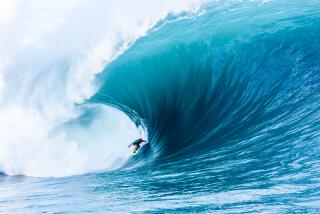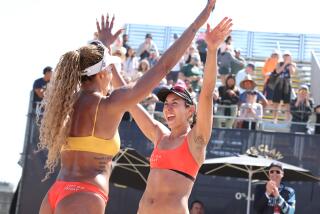Irons Gets Edge at U.S. Open
- Share via
Others had more incentive to perform well this week at the Honda U.S. Open of Surfing, but Andy Irons and Rob Machado relied on their experience and ability to reach Sunday’s final.
Irons, a 27-year-old from Kauai, Hawaii, held on to defeat Machado, 13.10-12.66, in small surf alongside the Huntington Beach pier.
Irons and Machado outlasted more than 200 competitors at the six-star World Qualifying Series event, a key steppingstone for those hoping to qualify for the 44-man World Championship Tour.
Irons is cemented on the WCT, where he’s the three-time defending champion. Machado hasn’t competed full-time in five years, instead content to free surf near his home in Cardiff and shoot occasional promotions for his sponsors.
Machado, 31, nearly stole the victory in the final minute, however, taking off on a long left with about 20 seconds remaining and riding it to shore. He needed a 7.77 out of a possible wave score of 10 to catch Irons, but only averaged a 7.33 from the five judges.
Machado, who won the 2001 U.S. Open title with a high-scoring ride in the final 20 seconds, wasn’t sure if he pulled it off again.
“It’s a tossup, you never know,” he said. “It’s up to the wise man up there.”
Irons, who won the U.S. Open in 1998 and advanced to the final in 2003, thought Machado, the crowd favorite, had pulled off another last-second victory.
“The crowd was going nuts and I’m like, ‘Oh no, here we go again,’ ” Irons said.
The Assn. of Surfing Professionals changed the competition format for qualifying series events this year, switching from four-man heats to two-man heats once the competition reaches the quarterfinals. The WCT uses the same format and Irons and Machado used their experience to their advantage.
Irons knocked off Brazilian Dunga Neto in the quarterfinals and Frenchman Mikael Picon in the semifinals. Machado disposed of Australian Adrian Buchan, ranked No. 1 on the qualifying series, in the quarterfinals and 18-year-old Brazilian upstart Adriano de Souza, ranked No. 3, in the semifinals. With the results, however, Buchan and de Souza put themselves in excellent position to remain in the top 16 and qualify for the WCT next season.
Machado first qualified for the top tour in 1993 and finished No. 3 in the world in 2000. Because he no longer competes full-time, Machado had to start Tuesday in the round of 144. He finished second in his opening heat and then reeled off six consecutive victories to reach the final. His performance was reminiscent of 2003, when he submitted his entry late and was forced to start in the opening round, then advanced to the semifinals.
Machado said even though he doesn’t compete full-time any longer, he still likes to put on a good show.
“When I was on tour, you had so many events that you just keep rolling to the next one,” he said. “Whereas this one, it’s like the only one I do now, so I feel like I really have to do good now. There’s not a lot of stress, but there is in a way.”
Irons, who joined the WCT in 1998 and won his first world title four years later, said he doesn’t take any competition lightly.
“Even in these waves, you get the nerves and you get the adrenaline,” he said. “Just the fact that it’s a competition, you want to do well. I think that’s what makes me want to win, the drive to win.”
Even though he’s considered the best surfer in the world, Irons wasn’t feeling confident heading into the 30-minute final.
“I was nervous, for sure,” Irons said. “I’ve gone against [Machado] in France and Japan in similar conditions and he just smoked me every time.”
With the two best wave scores counting toward a competitors’ total, Irons scored a 6.83 with about 14 minutes remaining in the final and tacked on a 6.27 with about nine minutes remaining.
Machado had high scores of 5.33 and 3.77 heading into the final minute. With about 30 seconds remaining, a decent wave formed and Machado performed four strong maneuvers before the wave crumbled on shore.
“You need an attainable score and you make the connection and you feel like you rode the wave pretty good,” he said. “[But] I don’t think I capitalized enough on the inside.”
More to Read
Go beyond the scoreboard
Get the latest on L.A.'s teams in the daily Sports Report newsletter.
You may occasionally receive promotional content from the Los Angeles Times.










